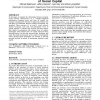Free Online Productivity Tools
i2Speak
i2Symbol
i2OCR
iTex2Img
iWeb2Print
iWeb2Shot
i2Type
iPdf2Split
iPdf2Merge
i2Bopomofo
i2Arabic
i2Style
i2Image
i2PDF
iLatex2Rtf
Sci2ools
CSCW
2004
ACM
2004
ACM
Emergent networks, locus of control, and the pursuit of social capital
In this paper we examine the relationship between emergent social network characteristics in a computer-supported collaborative learning course and locus of control. An emergent communication network of engineering students that took place in a distributed distance learning environment was examined. Three measures of an actor’s social network, density, brokerage, and reach, and participants’ locus of control, internal vs. external, were assessed. The data suggest that, relative to participants with external locus of control, participants with internal locus of control decreased their network density over time but increased their brokerage and reach. The results are discussed in the context of instrumental action, through which participants are assumed to develop personal networks in pursuit of maximizing potential social capital. Categories and Subject Descriptors K.3.1 [Computers and Education]: Computer uses in Education – collaborative learning, distance learning. General Ter...
| Added | 30 Jun 2010 |
| Updated | 30 Jun 2010 |
| Type | Conference |
| Year | 2004 |
| Where | CSCW |
| Authors | Michael Stefanone, Jeffrey T. Hancock, Geri Gay, Anthony R. Ingraffea |
Comments (0)

